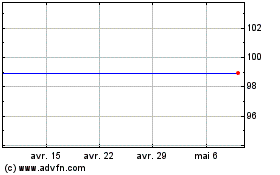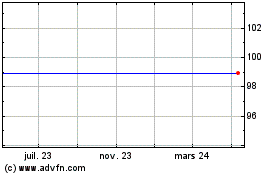Five Takeaways From Antitrust Case -- WSJ
13 Juin 2018 - 9:02AM
Dow Jones News
By Brent Kendall
This article is being republished as part of our daily
reproduction of WSJ.com articles that also appeared in the U.S.
print edition of The Wall Street Journal (June 13, 2018).
WASHINGTON -- A federal judge blessed AT&T Inc.'s takeover
of Time Warner Inc. and soundly rejected the Justice Department's
arguments to stop the blockbuster deal.
Judge Richard Leon said Tuesday that the Justice Department had
failed to show how the merger would harm consumers and that the two
companies should be allowed to proceed with their merger, without
any conditions or divestitures.
Here are five takeaways from the ruling:
1. Uphill From the Start
There is a reason the government rarely challenges so-called
vertical mergers like AT&T-Time Warner: The cases are hard to
win. The deal will integrate complementary companies that don't
compete head-to-head. In the typical merger lawsuit, the government
objects to the marriage of direct rivals that battle one another on
price and service. That dynamic was absent here.
Early on in the AT&T trial, the Justice Department appeared
to be having difficulties persuading Judge Leon. Those appearances
proved correct.
The AT&T trial was the first fully litigated vertical merger
case in 40 years. The Justice Department over the years has
harbored concerns that vertical deals could damp competition, but
it has usually resolved those concerns by settling with the
companies and placing restrictions on the merged firm. That
happened, for example, when the Justice Department allowed Comcast
Corp. to take control of NBCUniversal in 2011 and approved
Ticketmaster's merger with Live Nation in 2010.
2. Clouds Lift for Deal Makers
Companies, as well as antitrust lawyers, have had a difficult
time getting a read on antitrust enforcement under the Trump
administration, and the Justice Department's AT&T lawsuit had
left some potential merger partners on the sidelines until the dust
cleared.
Now, all that could change. Comcast, for example, could make a
bid soon to buy the bulk of 21st Century Fox, seeking to upend a
deal with Walt Disney Co. Other companies may also feel liberated
to move forward given the judge's sweeping decision in favor of
AT&T.
3. Justice Department in a Pickle
The ruling breaks a long winning streak in merger cases for the
department, which has succeeded in blocking an array of deals in
recent years, including two major health-insurance mergers that it
persuaded judges to block.
Other times, the department has doomed mergers without having to
go to court, including when Comcast dropped its bid for Time Warner
Cable in 2015 in the face of government objections.
The department's antitrust chief, Makan Delrahim, brought the
AT&T case weeks after he was confirmed by the Senate. He surely
would like to avoid a second loss on his résumé.
"We are disappointed with the Court's decision today," Mr.
Delrahim said.
4. For AT&T, Now Comes the Hard Part
Now that AT&T has won its prize, it faces a new set of
challenges, starting with integrating the two companies. The
telecom giant and Time Warner have different corporate cultures and
sets of expertise.
AT&T, meanwhile, has ambitious goals for the acquisition and
its executives acknowledged in open court that some of their aims
could be difficult to achieve. That includes AT&T's plans to
compete with Google and Facebook Inc. for advertising dollars by
creating a new platform that will allow the sale of targeted
commercials to customers based on their viewing preferences and
other personalized data.
AT&T said it expects to close its deal by June 20.
5. Judge Skeptical of Appeal
The Justice Department will have to decide almost immediately
whether to appeal the ruling, and the antitrust division will have
to consult with the U.S. Solicitor General's office before any
appeal is filed. Officials said after the verdict that they would
review the decision before deciding their next steps.
In a rare move, Judge Leon said the Justice Department shouldn't
bother asking for an emergency court order staying the merger
during appellate litigation. If the department can't win an
emergency stay during appellate litigation, AT&T and Time
Warner will be free to go ahead and close their deal.
Write to Brent Kendall at brent.kendall@wsj.com
(END) Dow Jones Newswires
June 13, 2018 02:47 ET (06:47 GMT)
Copyright (c) 2018 Dow Jones & Company, Inc.
Time Warner (NYSE:TWX)
Graphique Historique de l'Action
De Mai 2024 à Juin 2024

Time Warner (NYSE:TWX)
Graphique Historique de l'Action
De Juin 2023 à Juin 2024
